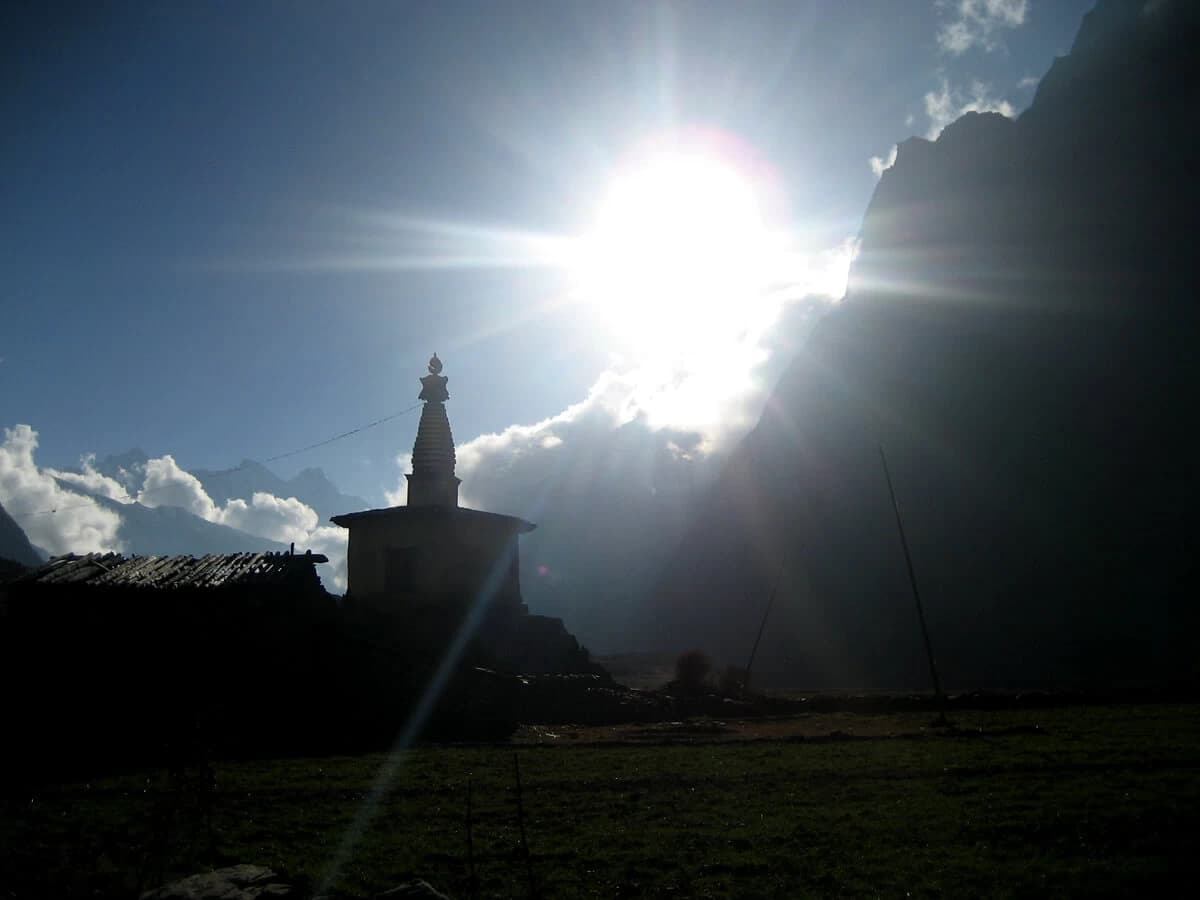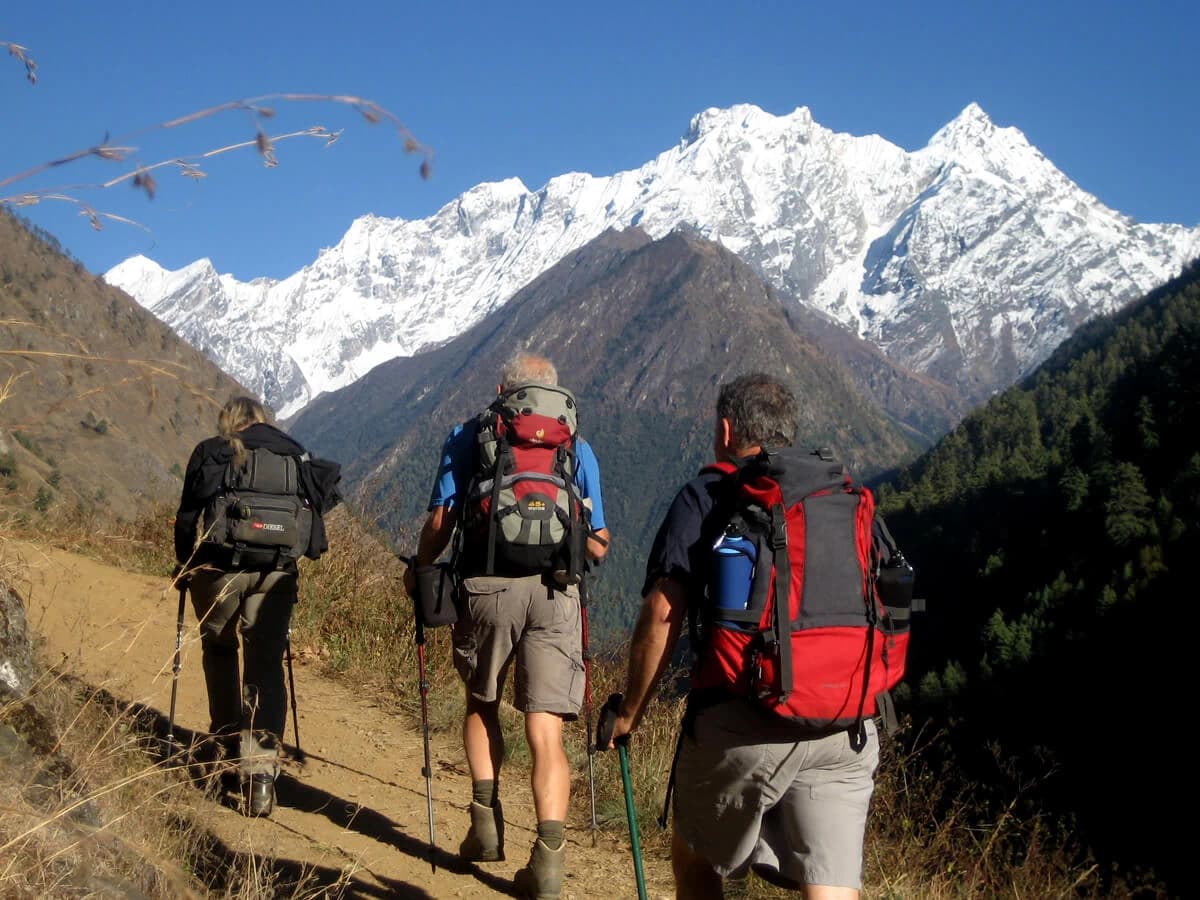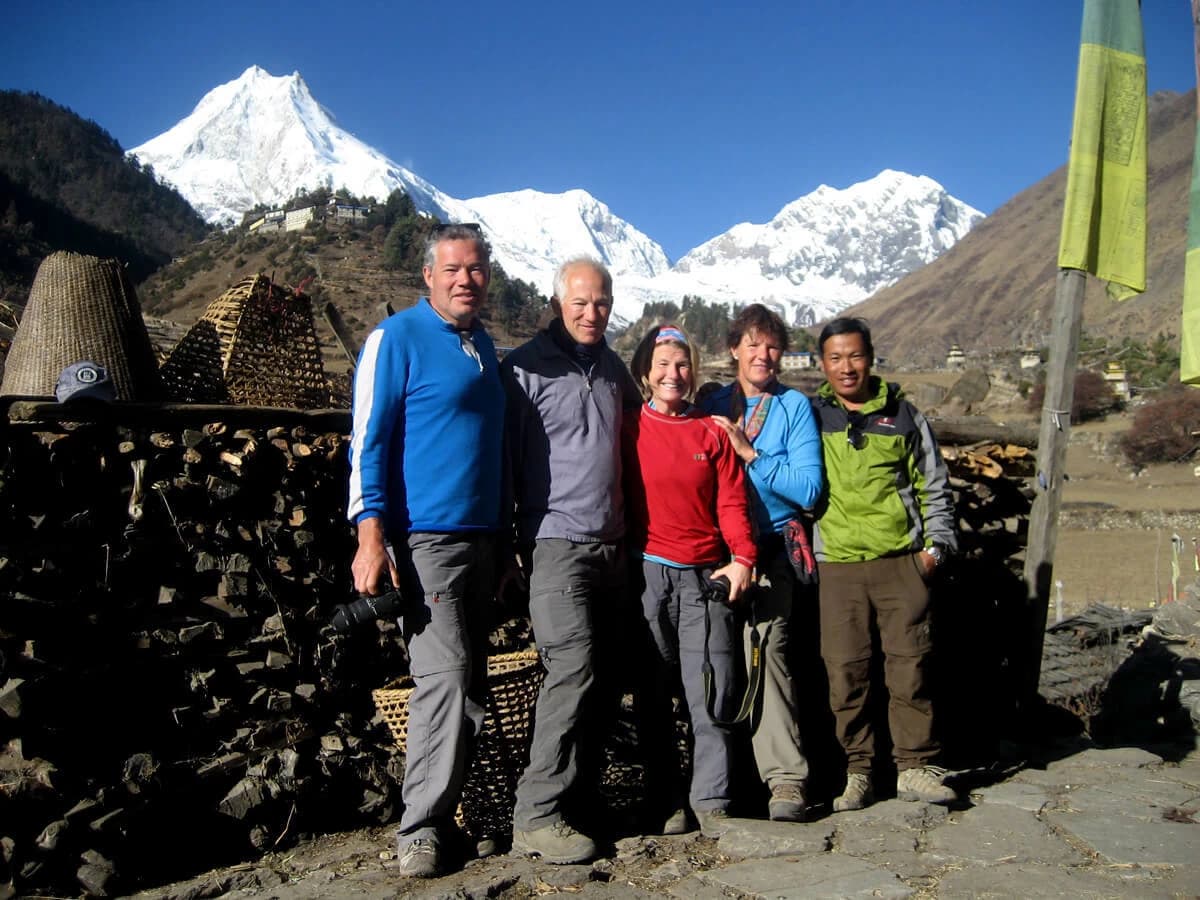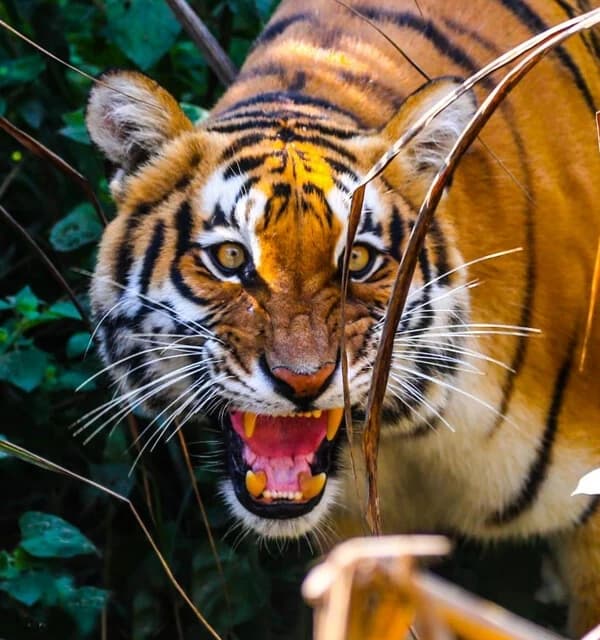Trek Manaslu and Tsum Valley, crossing Larke Pass (5160 m), for a remote adventure. Experience Tibetan culture, stunning peaks, and homestays in Nepal's hidden Shangri-La.
Manaslu and Tsum Valley Trek - 17 Days
Manaslu and Tsum Valley Trek Overview
Manaslu and Tsum Valley Trek through the dramatically adventurous Larke Pass (5160 m) is one of the most thrilling and appealing trekking journeys in the isolated and remote Shangri-La of Northern Gorkha in Nepal. This area is known as the land of monasteries, charming hamlets with rough, steep tracks, and less comfortable accommodations in Tsum Valley. The area is renowned for its homestay experience, getting engaged with locals, and magnificent mountain scenery, but it is less visited. It is located in the northern part of Manaslu at the Nepal-Tibet border and is remarkably popular among adventure trekking holiday fans. In 1991, the Manaslu region was opened for foreign visitors, and Tsum Valley was opened for trekkers in 2008. The area is geographically extra fabulous and culturally most attractive. The natives and locals of upper Budi Gandaki, a region known as ‘Nup Ri,’ meaning western mountain, are direct descendants of Tibetan immigrants; they inhabited it here during the early 16th century, so their language, dress, and traditions are completely similar to Tibetan. The mountain view in Nup Ri is astonishing and dramatic. Larke Pass is an exhilarating experience.
Why should you consider the Manaslu Trek with a side trip to Tsum Valley?
Tsum Valley is yet to be explored and discovered; it is exactly the place to trek for the rural traveler passionate about discovering a more unusual part of the world than yours. The valley is blessed with a Himalayan Buddhist pilgrimage site located in the northern part of the Gorkha district, Nepal. The word ‘Tsum’ refers vividly to the majestic background setting of the beautiful Ganesh Himal, Sringi Himal, and Boudha Himal ranges, and this tranquil Himalayan valley is enriched with ancient art, culture, and the Himalayan Buddhist religion. It is said that the Buddhist saint Milarepa is believed to have meditated in the caves of these mountains. The valley is home to some unique and historic monasteries, mani, kaanis, and prayer walls, which lie on a pretty highland nestled in the lap of the valley, and Gompa Lungdang, located at the base of a conical hill against the main slope of Ganesh Himal. The tribes here celebrate numerous Buddhist festivals, perform ritual burning of juniper incense to purify the air, and place prayer flags for the happiness of all the sentient living beings installed in Mani Walls. The remote area has been left behind, so their culture remains as it was hundreds of years ago. The trek is appealing for wilderness lovers away from their comfort zone.
What are the logistics of the Manaslu Trek via Tsum Valley?
Manaslu and Tsum Valley Trek can be accomplished as a lodge trek, also known as a teahouse trek, now that Tsum has several lodges, fine homestay services, and toilets available in most places. There are now phone call services throughout, and rare mobile reception in case of an emergency. The isolated Tsum Valley side trip should not be missed if you are doing Manaslu. The area draws attention to its complete well features of the trek, with strong, friendly, welcoming locals, a living Buddhist culture, and untouched wildlife because of Buddhist prohibitions on hunting and killing. The people are poor since they have been bypassed by development for centuries, but this means their unique culture has remained ideal and intact. However, a road from China is already pegged out and will cause rapid change. Tsum is said to be a Beyul, one of the hidden valleys that 8th-century Buddhist saint and master Padmasambhava blessed as refuges to be discovered when the planet is approaching destruction and the world becomes too corrupt for spiritual practice. They are valleys reminiscent of glory and paradise, which can only be reached with enormous hardship.
Main Feature of Manaslu Circuit Trekking with Tsum Valley:
- 16 nights and 17 days guided Manaslu and Tsum Valley Trek.
- Get out of the luxury zone and experience a public bus ride from Kathmandu to Soti Khola
- Learn about isolated Tibetans, like the local people, and their lifestyle
- Mount Manaslu, the world’s eighth-tallest mountain, and its glacier
- Discover Tibetan Buddhist monasteries and religious monuments.
- Venture through the dramatic Larke Pass over 5106m
- Walking through tropical green hills, alpine, and tundra zones
Cost of Manaslu and Tsum Valley Trekking Permit for the year 2025/26
These controlled area permits for Manaslu and Tsum can be obtained from the Department of Immigration in Kathmandu. Both Manaslu and Tsum require separate permits. Joining a registered trekking agency is obligatory to get permits, and it is mandatory that you be accompanied by a licensed guide. A party of two or more foreigners should be in a group, although these requirements may be relaxed in the future. The Manaslu Trek Permit Costs are USD 100 for the first week (then USD 15 per day) for September, October, and November, and USD 75 for the first week (then USD 10 per day) from December onward till August. For Tsum, the same periods apply, but the fee is USD 40 for the first week. You will need a TIMS card (Trekkers Information Management System) as well if you are continuing on the Annapurna Circuit through Thorong La Pass, so you’ll need 4 photos for all this. In our experience, if you are only circuiting Manaslu, your special permit means that a TIMS card is not required.
You will need two additional permits: MCAP (Manaslu Conservation Area) NPR 3000 each and ACAP (Annapurna Conservation Area) NPR 3000 each for the section from Dharapani to Besi Sahar after you join the round-Annapurna trail.
How are accommodations and meals on the Manaslu Trek with the Tsum Valley Side Trekking Route?
As there are now lodges and teahouses, you do not need to bring food and camping gear from Kathmandu; you could stay in teahouses and eat there. Wilderness Excursion arranges a local, experienced guide for your Manaslu and Tsum Valley for the entire route to ensure that immediate benefits flow to this remote area and to get an insight into the culture.
How long is the itinerary and the distance of the Manaslu trek with a side trip to Tsum Valley?
We have crafted an 17-day itinerary; however, you can ask us to customize the trip, and even you may like to add more of some other excellently recommended side trips, such as the Manaslu and Tsum Valley routes, to explore more going out of the main track that provides you with a peaceful retreat environment without others distracting your mind.
This is our very first day, after a nice breakfast, embark on the Manaslu Circuit Trek followed by a scenic drive to Machha Khola from Kathmandu. A driving road distance of 162 km which take 9 to10 hours depending on road conditions. You can opt to rent a 4WD private jeep drive for a comfortable and fast drive than a public bus.
We will drive along the Trishuli River and then turn lest to Dhading (3-4 hrs) then head to Arughat – Soti Khola and finally to Machha Khola, which is our trekking starting point. Overnight in a trekking lodge at Machha Khola
We trek from Soti Khola to Machha Khola today encountering with the majestic mountain ranges and unspoiled culture. Soti Khola to Machha Khola trek distance is 14.1 kilometers / 8.7 miles. Sotikhola village situated at an altitude 730 meters Machhakhola at an elevation of 930 meters above sea level. It takes 6 to 7 hours to get to Machha Khola altitude from Soti Khola via Armala, Lapubesi, Nauli khola, Khanibesi steeply uphill along Bhuri Gandaki River. Meals included: Breakfast, Lunch and Dinner.
Climb above a ridge and cross the Buri Gandaki on a new suspension bridge, circle under cliffs and climb a little to Doban (1070m; Dovan) where there is the Himalayan lodge, alternative place to stay if we skip Tatopani. Shyaule Bhatti lodge is 40mins later then 20mins to Manaslu Santi and Thulodhunga (‘big rock’) lodges where you can take tea and look at the wild gorges ahead. After a landslip and Yaruphant (1140m) cross the bridge across the Yaru Khola (1363m) and emerge onto riverflats at Yaru (1140m) for lunch at the Sandbar Hotel. Look downstream at the massive rockfall that chokes the river. Just past Yaru, cross to the true right bank and enjoy easy up and down to Jagat (1410m), a neatly flagstoned Gurung village where jagat (‘tax’) is collected on Tibetan trade. You will need to show your MCAP permit at an office on the left. In this area, potato, maize and climbing beans are all planted at the same time – the potato for food and to suppress weeds, the maize for food and to supply a trellis for the beans, which are an important source of protein. Marijuana is a major weed problem in season. Walk up the riverbed then climb over a rocky ridge to Salleri (1440m) with views of Sringi Himal (7187m), then descend to Sirdibas (1430m; Setibas, Tara). You’ll see your first signs of Buddhist culture here. Look out for rakshi spirit being distilled from millet beer in roadside kettles on this day. Continue up-river on the left bank, up and down before crossing Nepal’s longest suspension bridge to the east bank and a tiring climb up to prosperous Philim (1590m; Dodang) surrounded by rich fields of maize, potato and millet. There are shops and grocery. After lunch break at Phillim or at Chisapani, we further hike to Lokla today. Overnight in Lokpa. Meals included: Breakfast, Lunch and Dinner.
Traverse north out of Philim on the obvious track signposted to the Larkya La, through some pretty forest with views up the narrowing valley. After 1hr climbing enter the increasingly misnamed Ekle Bhatti (1600m; ‘lone teashop’) with at least six bhatti and newly built lodge now, then traverse high above a spectacular gorge, entering a largely uninhabited area of pine trees. Eventually drop to a trail junction going left to Ghap and right to the Tsum Valley, just above Gum Pul (‘bridge’). Climb on a well-graded but exposed track through pines and rhododendrons, looking down on the other trail across the river. If the slopes here have recently had their annual burn there is a real risk of stonefall from the cliffs above, especially if there are goats grazing. Climb on zigzag steps, increasingly exposed, and gain your first glimpses of the narrow lower Tsum Valley, very steep across the Siyar Khola (Shiar Khola) which drains from the very top of the valley. Across the Buri Gandaki is Himalchuli (7893m) above steep cliffs. Walk through a largely intact and peaceful temperate forest into Lokpa (2240m; Lakuwa), surrounded by barley fields with two lodges and extensive camping terraces and a huge stock of Chinese alcohol. Descend through beautiful forest, crossing two new bridges, circle under a huge bluff on the river then climb steeply on deteriorating exposed stairs. After about 30mins start to traverse north through pines and rhododendrons, still climbing and with very steep slopes. The hidden valley of Tsum stretches enticingly ahead. Eventually descend to a deserted bhatti Ghumlong (2130m) on the river. The path straight ahead climbs steeply to Ripchet (2470m; Ripche) in about 1hr; the path to Chumling (2360m) crosses the Siyar Khola on a wooden bridge and up. It is not for those afraid of heights – several locals have fallen to their death from this track while drunk. After about 30mins, below Chumling, take the level track to right (east) for 15mins to arrive at a lodge with 6-8 beds. Make sure you climb up to Chumling and check out the old gompa, the traditional houses, orchards, clinic and beautiful stone streets. This is Buddhist agriculture, with conical pine needle haystacks among the prayer flags. From here on trails are lined with artistic chortens and mani walls made of thousands of stone slabs carved with deities and prayers.Meals included: Breakfast, Lunch and Dinner.
An easier day after yesterday. Cross the suspension bridge just east of the hotel and traverse through rich farming land of maize and potatoes. The houses are classic Tibetan with barricades of firewood on the roof, but without flat roofs as it rains and snows here. Cross a huge slip where rocks and flood cleared the area even up onto the opposite bank, killing five in 1999, but is now covered with a forest of new trees. Up the valley to the east are superb views of several of the 7000-7400m Ganesh Himal, of long suspension bridges on the opposite bank, and far above the perched village of Ripchet (2468m). Your guide may find somebody willing to cook lunch at Rainjam (2400m), a single bhatti with enclosed courtyard. Cross the Serpu Khola and climb for over 2hrs on well-graded but exposed track to upper Tsum and the joined villages of Chhokang-Paro (3010m), stone houses with a few iron roofs nestled under cliffs. The valley opens here into spacious fields of barley, maize, buckwheat and potato, but wheat has been abandoned due to ‘hill bunt’, a disease which turns the heads black and causes total crop failure. Herds of thar often graze the wild cliffs to the north, coming right down to the fields. The Tashi Delek lodge has some 18-bed rooms. If the air is clear Himalchuli (7893m) can be seen down valley.Meals included: Breakfast, Lunch and Dinner.
Most people can climb to 3000m without getting altitude sickness, but the altitude gain in these track notes above Chhokangparo is right at the 300m per day suggested for safety. Watch for signs of altitude sickness and be prepared to rest or retreat if they emerge. Take time to explore the village and climb north to a retreat where Lama Kongchog died after 26 years of meditation. His child reincarnation, found in the village, was subject of the award-winning DVD Unmistaken Child (available in Kathmandu). There are often sighted near here. The friendly people speak Tsumba, related to Tibetan, but often little Nepali and are quite unused to visitors. Head east through small villages and past a local school, climb over a ridge of chortens and past Lamagaon (3202m) through the flat fields, looking across the extensive crops and river to the huge courtyard of the Rachen Gompa (3240m) with excellent pilgrim accommodation. You can pay Rs 300 and get a key for a visit to Milarepa’s Cave (Piren Phu), where the bringer of Buddhism to Tibet is reputed to have meditated. Cross the Shiyar Khola, pass through hamlets of Phurbe (3251m) and Pangdun (3258m) and pass an unusual round stupa before reaching the larger village of Chhule (3347m) through an impressive entrance gate (kani). There is one homestay in Chhule, turn right above the bridge. The children here all wear the Tibetan dressing gown called chubas and there are many yaks. Head upstream to cross the bridge and climb to Nile (3361m; Nyile, pronounced Nee-lay). Both villages are in traditional style with inclusion of livestock compounds into the houses and sheltered verandahs for drying crops. Lobsang Homestay now provides room can be sheltered for some 20 trekkers..Meals included: Breakfast, Lunch and Dinner.
We will leave our bags in hotel behind and visit Mu Gompa as a day trip, we also visit the isolated Dhephu Doma nunnery. Make up valley on the west bank, enjoying sunrise on the narrowing valley walls and yaks being put to pasture. The final climb up to the large Mu Gompa (3700m; Mugumba) is through dry Tibetan country, with rows of chortens and widening mountain vistas. This is a large monastery with over 100 monks and an ancient gompa visited by David Snellgrove (Himalayan Pilgrimage) in 1956. They provide basis accommodation and daal bhat for visitor. Try tsampa (roasted barley flour) for breakfast with tea or even Tibetan butter salt tea. On three sides now are tantalizing views of the border with Tibet, with frequently used passes to the east (Ngula Dhojyang or Mailatasachin Pass, 5093m) and west (Thapla Bhanjyang, 5104m) just out of sight. Some people climb to Kalung (3820m) or Bhajyo (4030m) and camp, making a daytrip to the passes for a view into Tibet. Mingma Lama (enquire in Nile) can organise accommodation and/or horses if you want to do this. It takes about 4hrs to climb to the pass from Bhajyo and 3hrs down. From Mu Gompa there are extensive seasonal yak pastures in all directions, the Lungdang Glacier to the east and high peaks in all directions. In the early monsoon, in pastures at 5000m, many Tsumba collect the most expensive natural medicine in the world, known as yarsagumba. This is the caterpillar of a ghost moth parasitized by a fungus Cordyceps sinensis and is worth USD 25,000/kg in China as an aphrodisiac and cancer cure. The isolated 600 year-old Dhephu Doma Gompa (3900m) is 30-45mins uphill on the obvious westward track and has two resident nuns who report seeing snow leopards and musk deer and may give you tea. The inside of the gompa has been repainted by monks from Tibet and there is some ancient thankas. We trek back to Chhekamro via Rachen Gompa after Mu Gompa excursion. Overnight in Chhekamparo. Meals included: Breakfast, Lunch and Dinner.
This can be a taxing day so start early. Descend to Domje, where there are no lodges or bhatti, by the upward track. Cross the Laudang Khola on a new swing bridge between the two lowest houses in Domje and stay on the south (true left) bank of the Siyar Khola (contrary to the map). Traverse 10 mins on a new trail through lovely forest until a choice of upper or lower trails – either works, the lower is best. Cross some very deep gorges on new swing bridges to picturesque Ripchet (2470m; Ripche) where there is a home stay and you can get lunch if you ask around. Take time to look around at this perched fertile valley of barley and buckwheat with evocative chortens in the fields backed by pine forest. Descend on steep loose stairs to the deserted bhatti Ghumlong (2130m) on the river, which you passed through some days ago. Climb again through the pristine temperature forest to Lokpa (2240m), enjoy a comfortable bed in the lodge there and maybe a bucket bath in the toilet or camping toilet. Overnight in Lokpa. Meals included: Breakfast, Lunch and Dinner.
Continue from Lokpa down the exposed track until the track from Philim comes in from the left. Turn right, cross the Buri Gandaki on a solid bridge after about 1hr and traverse to a welcome bhatti just around the corner for tea and a last look up the Tsum Valley. Enter a very narrow gorge with loose tracks, up and down, up and down. Cross through bamboo forests to Deng (1800m), inhabited by Gurungs who practice Buddhism. Lodging at Manaslu Trekker Home (10 rooms, Shangri-La. Just beyond Deng recross to the east bank and climb to Rana (1980m) and pass Bihi Phedi (1990m, Himal and Manaslu hotels) with the trail up to the stone-carving village of Bihi (2130m; Bhi). The river roars below. Continue in and out of continuous wild canyons, with a village perched in every conceivable cropping situation, cross the Serang Khola coming from the north and climb steeply again before finally circling into Ghap (2160m; Tsak) past Mountain View lodge where the horses stay, Budhi Gandaki Lodge. The mani walls here and onwards as far as Bimthang often display intricate quality carvings of various Buddhas in meditation, incised in the hard local stone by a family of carvers from Bihi. The Manaslu Thakuri lodge and Kyimolung lodge and camping ground are in Ghap itself and building is underway. A side-trip from a bridge below Bihi can take you up to Prok (2380m), with an ACAP office and emergency radio and an excursion to Kal Tal (3685m; Kalchhuman Lake), then back down to Ghap. There are two lodges in Prok and those who visit really enjoy the experience, including a lake 1200m higher for which a local guide is advised. Overnight in Ghap. Meals included: Breakfast, Lunch and Dinner.
Enter a beautiful forest of fir and rhododendron with many birds, staying on the south bank, cross north on a bridge with a roaring narrow canyon below then cross back to the south bank on a new swing bridge with grey langurs watching. The main trail now climbs on well-made stairs, but a highly recommended narrow shortcut to the right just after the bridge and along the riverbank is far quicker and through superb pine forest. After about 1hr, climb a zigzag from the river to the neat village of Namrung (2660m) with shops, restaurants and the Thakali, Thakuri and Namrung lodges about the flagstoned square. While waiting for a meal it is worth wandering around the village, where carvings from Bihi have been painted in colors above a gateway. The architecture characteristic of upper Nupri starts here: several houses gathered together about a common courtyard and livestock shelters on the ground floor, with heavy wooden shingle roofs and log stairs to dark verandahs. Pass mani walls, fields and houses through Banjam (2800m, Banzam) with Nubri Trekkers Inn. Enter the fir, rhododendron and oak forest before climbing to Lihi (2900m; Li, Ligaon) with the Lihi Hotel in 1hr, then onto Sho (2950m, Syogoan) where there is a bhatti but no lodges yet. The platforms in the fields are where people keep overnight watches to chase bears from their crops. Most people from here onwards wear traditional Tibetan dress, with the children in small chubas like dressing gowns, asking for shim shim (Tibetan for candy). Some have impeccable English due to an Australian aid project. There are some particularly fine paintings in the kani (gate arches) that you pass before Sho. Shrip (3000m) boasts the Nupri Eco-hotel. A leisurely walk onwards, in and out of gullies to Lho (3180m) with Tashi Delek lodge, Lho Majesty Cottage Lodge. Pity about the wedding-cake stupa donated from Taiwan which dominates this otherwise picturesque village focused on yak herding. There are excellent views of Manaslu (8163m) and Manaslu North (7157m) from the mani wall at the far end of the village and from the gompa on the hill to the west. Overnight in Lho. Meals included: Breakfast, Lunch and Dinner.
Today; it is a short day of 2-3 hours walk takes you into the mountains with time to enjoy and acclimatize. The views of Manaslu are stupendous. Easy walk to Shyala (3520m, Syal, Syalagaon, Shyaula) up a pine and rhododendron gully with moss and gin-clear stream. Enjoy 360° views from here due to a fire and extensive deforestation and extensive building including the lodges on the trek under construction, currently Manaslu Pik 21 Hotel and Gurkha Manaslu Homestay. Another easy hour to the large village of Sama (3520m, Samagaon, Ro), losing the gigantic views of Manaslu but entering a world of yaks, pastures and houses which seem to have grown from the stones. Only potatoes and barley can be grown at this altitude. There are several lodge in Samagaon. Overnight in Sama. Meals included: Breakfast, Lunch and Dinner.
Rest days to get physically acclimatized. We can spend the day exploring surroundings such as, Birendra Taal (lake), Buddhist monasteries, Samagaun, a big Tibetan cultured community and a side trip to Pun Gyen Gompa or Manaslu Base Camp but this both side trips requires almost a full day for each. We will see a marvelous view of Manaslu. Day-long acclimatization trips can be taken from here to Pungyen Gompa or to Manaslu Base Camp (4900m) An afternoon walk to the Kargyu Chholing Gompa and Birendra Lake is recommended. Stay overnight at same place. Meals included: Breakfast, Lunch and Dinner.
Another short day because of the altitude, with time to go via the iceberg-covered Birendra Tal (3450m) under the Manaslu Glacier, wade the exit stream depending on the time of year and drop down to pick up the main trail from Sama to Samdo. Easy walking through yak pastures up a broad valley with long mani walls, marmots in April but not November standing on their burrows. Finally leave the tree line behind, although low-lying juniper is all around, climb to a ridge and drop to cross the Buri Gandaki on a wooden bridge. It takes some time to reach the white kani above but immediately behind is Samdo (3860m), a very picturesque village dedicated to yak herding, so much so that there are more animal and fodder shelters than human accommodation. Lodges are Chez Kyrang, Yak Lodge and Tibetan Twins, comfortable although likely to be cold at this altitude. Side valleys and Samdo Peak call out for afternoon wandering but take a jacket as cold wind can come up at any time. The Larkya La trail is ahead up valley and left. You can see the main track for Tibet over the Larjyang La (Lajyung Bhanjyang, 5098m) sloping up to the right from the Larkya La trail and you can make an excellent afternoon acclimatisation walk of 4-5hrs return to 4500m up this trail, seeing lots of blue sheep and yaks and entrancing views, but the pass itself is a full day trip. The first village and road in Tibet is about 2hrs beyond the pass with access currently blocked by China even for locals. There is a lot of Chinese and Tibetan alcohol and food for sale in Samdo. Overnight in Samdo. Meals included: Breakfast, Lunch and Dinner.
Walk beyond Samdo on a broad trail, dropping to cross the much-reduced Budhi Gandaki at 3850m. Leave the trail to Tibet to the right and climb left after a mani wall, traversing through juniper with many marmots in April but not November when they hibernate. Cross two ravines on narrow tracks, very icy towards winter. There is no Larke Bazar despite what many maps assert; at one time traders from Namche Bazar came through Tibet to trade in this area and maybe some of the scattered stone shelters you will pass were part of that market. Dharamsala (4460m; Larke Phedi, Larkya Resthouse) is now a seasonal place with dark stone rooms and tents for at least 50 people and a dirt-floored but efficient dining hut. Even toilets are available. In 2012 this entire place opened 1 October and closed for winter on 24 November, so check in Samdo before counting on staying here. The camping area is filthy with toilet trenches, rubbish and blowing toilet paper so be careful where you get your water and boil it well if camping. The views are marvellous. A large herd of blue sheep call the tussock-covered hills home and we saw snow leopard prints in fresh snow around the toilets.. Overnight in Dharmasaala. Meals included: Breakfast, Lunch and Dinner.
Note that if snow has fallen overnight and there have been high winds, then there may be less snow as you climb making the pass still crossable. Climb steadily over the ridge behind Dharamsala and beside the large lateral moraine of the Larke Glacier. The climb is not difficult but it is long and rocky underfoot, particularly as you top the moraine. Look for cairns and metal snow poles which assist route finding. Descend past four frozen lakes and make a final tiring climb to the left up to Larkya La also spelled Larke La (5160 m), marked by prayer flags. It takes about 3-5hrs to reach the pass and it can be very cold and windy with a risk of exposure if under-equipped or ill. The peaks to the west are Himlung (7126m) near Tibet and Kang Guru (6981m) and Annapurna II (7937m) in the Annapurna Range. Trek west on a high moraine ridge exposed to wind for some distance, on the right side of a deep gully, then drop steeply on loose scree, eventually traversing left on more steep scree. There are several places where snow or ice would make this treacherous and some groups fix a rope on the steepest piece. Make a long descent on loose gravel to a welcome more level area with grassy moraine, where the angle eases. The track now runs left of the large lateral moraine, rocky at times, in a widening and beautiful valley all the long way to very scenic Bimthang (3720m; ‘plain of sand’), a descent of 1400m in about 3hrs. The views during the descent are huge – icefalls and mountains in all directions, a medial glacial lake (Pongkar Tal) between the Pongkar and Salpudanda Glaciers, and the joining of these two glaciers with a third glacier to form the Bhimdang Glacier whose lateral moraine towers over Bimthang. Overnight in Bimthang. Meals included: Breakfast, Lunch and Dinner.
Walk south below Bimthang behind the moraine wall for some time before crossing the Bhimdang Glacier, which can be loose underfoot. Climb up the far moraine wall quickly to avoid stone-fall and enter some of the best forest in Nepal. If you are in rhododendron season, the mauves, reds, pinks and whites are stunning amongst the huge pines and the views of the back of Mt Manaslu are superb. Descend rapidly along the true right bank of the aptly named Dudh (‘milk’) Khola through a bhatti at Hompuk (3420m) in a forest clearing. Gentle riverside walking continues rapidly to Karche (2700m; Kharche, Surki Khola, Suti Khola) for lunch after about 3.5hrs. This would be a great place to spend a night, with Saat Kanya Hotel or Himalayan Cottage cottage. In the next hour you will see many signs of a glacial flood, with tree trunks smashed and banks undermined, the track becoming quite rough. Climb steeply over a ridge and drop to Gurung Goa (2560m, Gho), the first real village since Samdo. There are new lodges here, lunch if continuing. The valley becomes more agricultural as you pass fields and copses of oak and rhododendron, staying on the north (true right) bank until Tilche (2300m). Overnight in Tilche. Meals included: Breakfast, Lunch and Dinner.
After our breakfast we will catch a local jeep or bus get a bus to Beshisahar and connecting local hiace van drive to Kathmandu. This is will be a long day drive. Considering to extend a night and stay overnight in Besi Sahar allows you to travel relaxingly to Kathmandu. Transfer to hotel in Kathmandu. It will be a long day drive.
Our proposed Manaslu Circuit Trek with a side trip to Tsum Valley trekking itinerary is 17 Days. It can be customized or slightly changed according to your requirements, considering your shape, pace, and trekking habits, which may cause a change to the day-to-day plan.
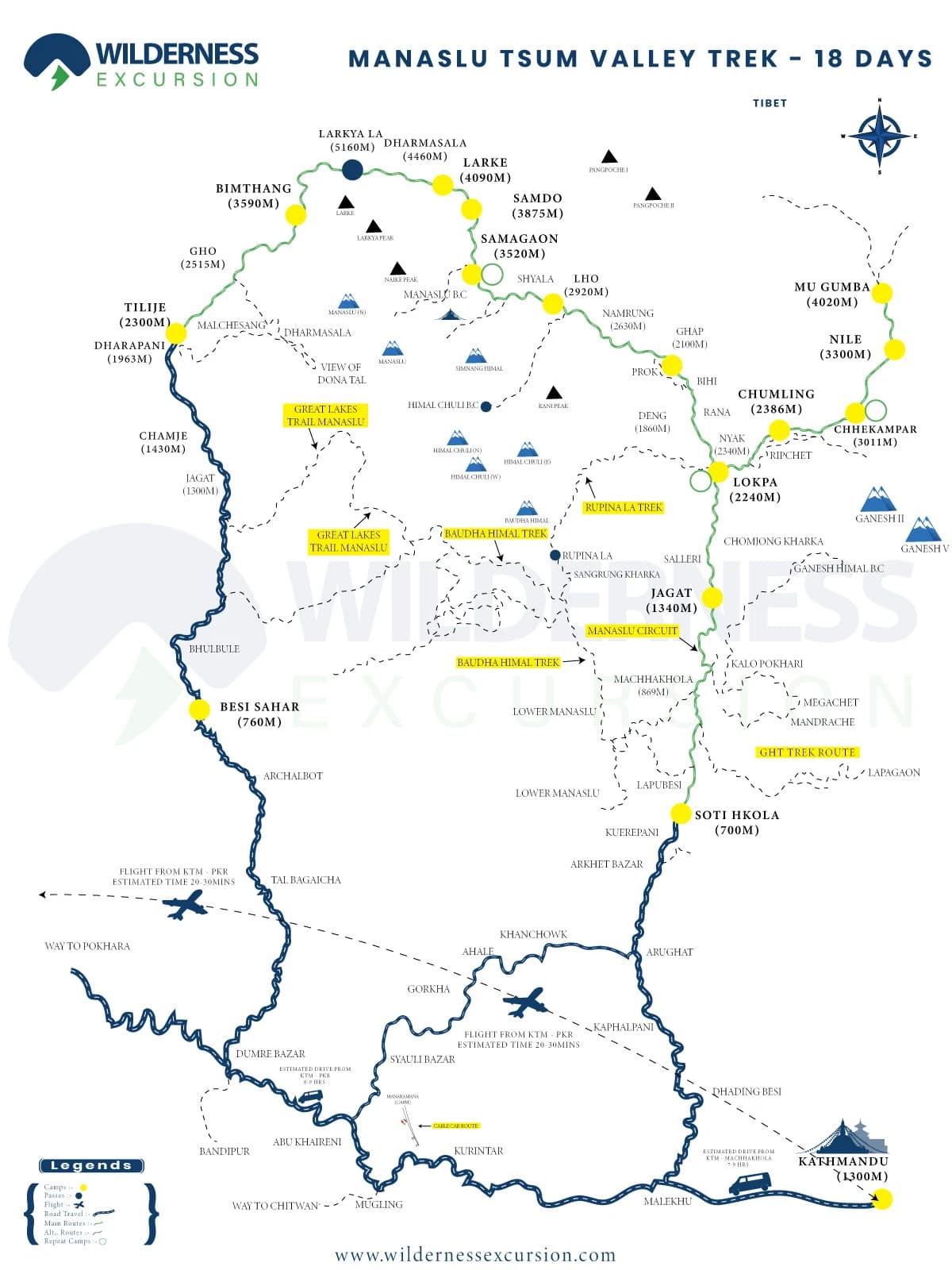
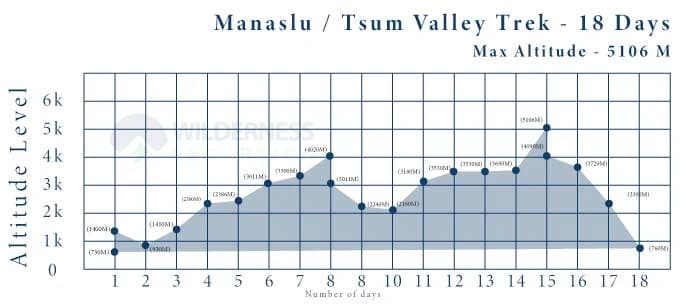
- Manaslu and Tsum Valley local trek with a private guide for 17 days, as per the itinerary.
- An assistant guide if the group size exceeds 6 people
- One shared porter between 2 trekkers to carry your main pack (weight limit: 25 kg)
- Meals: 17 breakfasts, 18 lunches, and 17 dinners during the trek.
- Lodge and homestay accommodation on a double-sharing basis.
- Guides and porters wage with all their expenses for the trek.
- All necessary Manaslu and Tsum Valley trekking permits.
- Public bus transportation to the starting point
- Public shared jeep from trekking to Besi Shahar & Kathmandu
- All taxes and documentation fees.
- Bar bills and beverages such as Coke, mineral water, beer, etc.
- Transfers, meals, and accommodation in Kathmandu.
- Guided tour in Kathmandu (can be arranged upon request at extra cost).
- Laundry service, toiletries, and personal nature expenses.
- Hot shower and hot water, internet, and phone calls
- Personal travel insurance and trekking gear.
- Rescue operation charge in case of emergency.
- Tipping your guide and porter.
At Wilderness Excursion, 13 years of excellence in operation with decades-long expertise in leading treks in Nepal. To further enhance your Manaslu Tsum Valley Trek, we’re pleased to introduce exclusive add-ons for an even more exceptional adventure.
Private Jeep Service USD 165: Upgrade Your Transport for a More Comfortable Journey; an extra cost of 165 to Machha Khola from Kathmandu and return transfer by private jeep to Kathmandu, USD 215 shared price among participants.
Benefits of upgrading to a private Jeep:
✓ Direct route: No multiple stops like the public bus
✓ Faster travel time - Reach the trailhead sooner
✓ More space: Comfortable seating for you and your gear
✓ Flexible departure: Choose your preferred start time
✓ Scenic comfort: Enjoy the views in private comfort
Check our dates published to see if it matches your time. We are happy to customize your tour perfectly to match your interests and needs, creating a unique travel experience just for you
Typically you will need 18 to 21 days to complete Manaslu Circuit Trek with side trek to tsum Valley for a week. And there are hidden side trip worth to visit. The length of trek will be according to your pace and side trip you include on it.
The Manaslu and Tsum Valley Trek is located in the northern part of the Gorkha district in Gandaki Province within the Manaslu Conservation Area, and it is west of Kathmandu, the capital city of Nepal.
Manaslu and Tsum Valley Trek is rated as a moderately difficult trek requiring good physical fitness due to long hiking days on steep, rugged, and rocky terrain, with many ascents and descents. Altitude is a significant challenge, going over 500-meter elevations, and the remote nature of the region means basic amenities, making good preparation and a guide essential for a safe and rewarding experience.
In the Manaslu and Tsum Valley treks, charging cameras and mobile phones is possible at most lodges and teahouses, but it typically involves paying around NPR 100 to 200 per device for a full charge. The power is often from solar or small generators, which can be unreliable. Therefore, Wilderness Excursion suggests that you fully charge your gadgets where electricity is available and carry a power bank and/or a portable solar charger as backup.
Usually, almost all the accommodations in Kathmandu and Pokhara keep your excess luggage for free storage; if not, Wilderness Excursion will keep your stuff and get it after the trek completion. Check with your accommodation if you can deposit the baggage with hotel you stay.
You can get bottled water on the first two days and the last days of the trek, but where bottled water is banned to stop the environmental pollution, you can get safe drinking water, or you can use the purifier (use a tablet or device) to drink spring water.
No, you can not use the Credit or Debit Card in the Manaslu and Tsum Valley Trek; you are advised to get enough cash exchanged or withdraw while in Kathmandu.
We had the pleasure of doing the Manaslu trek with a side trip to Tsum Valley this past November (2024) and felt very fortunate to be matched with my guide, Aital Tamang and porter (Ram). Both men were fantastic: sweet,...

Great trekking support from a local company.
I just finished another fantastic trek with Wilderness Excursions. It is my second trip with them, having completed the Lumbasumba Trek in 2019. I was again impressed with Pradip's skills, professionalism, and friendly...

Manaslu Circuit Trek - The trekking of my lifetime!
Thank you so much for an absolutely incredible 12-day trek around the Manaslu Circuit! Every moment was magical—from the breathtaking mountain views to the warm hospitality of the local communities.
A...

